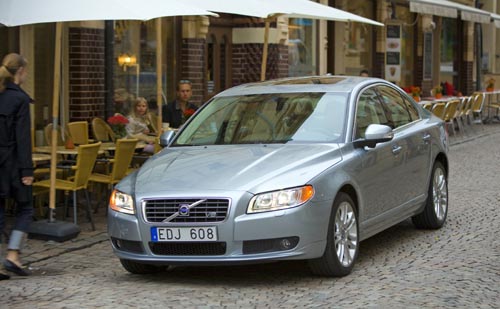Using recycling, perhaps the most common of the three “Rs” (reduce, reuse and recycle), Volvo brands itself with the sustainable mentality, which has largely altered the way humans think, act and now market in an attempt to be worthy stewards of earth. All three tenants of the pro-ecosystem mantra are crucial to correct any destructive action, but the last one seems to have stuck with particular resonance to the psyche.

Recycling is a great practice for the environment in that it keeps products out of landfills and removes the need to make more products from virgin materials — in this case, metal ore, water and whatever is needed for automobile plastics. It is contemporary society’s call to recycling action for which Volvo is basing marketing strategies.
Browsing this auto manufacturer’s U.S. website, and one can find an environmental page that addresses this very issue. According to Volvo, its cars are designed for “85% recyclability and 95% recoverability.” And, since many view recycling as a good thing, this marketing effectively makes consumers think Volvo automobiles have a particularly high concentration of goodness — at least that’s what Volvo is hoping for. This then begs the question of “how recyclable are any other car brands?” According to one article on howstuffworks.com, “About 65 percent of a junked car is made from steel (the rest is made from other metals, glass, rubber and upholstery).” Technology today has developed so not just the metals can be recycled, but also many types of plastic, glass and rubber. This article also cites the EPA in saying, “Recycling metal uses about 74 percent less energy than making new steel.” Logic would indicate that Volvo has concentrated efforts on recycling metals, plastics, glass and rubber in order to reach this proclaimed recycling rate of 85%. Evidence of this is Volvo’s statement on its website’s “environment” section that declares, “Steel goes into new cars, while metals from the catalytic converter are reused in new catalysts. Even our batteries’ plastic covers become the wheel-arch liners on new cars.” From browsing other automakers’ websites, it seems that Volvo might be tops on the recycling front, if for no reason than other car companies simply aren’t showing recycling stats of their own. However, one impressive tidbit that a recent Wall Street Journal article illustrates is that Nissan’s all-electric Leaf not only changes the automobile game by eliminating gasoline, but also by the recyclability of its electric battery. This is particularly of interest since batteries have been notoriously difficult to dispose of properly in the past. The article informs us, “Nissan expects that the battery packs will still have 70% to 80% of strength after 10 years, depending on how hard they’ve been exercised. Even after the cars are retired, the battery packs are powerful and valuable (and completely recyclable, by the way) as stationary power sources or buffers at intermittent generation sources, such as wind farms.” When promoting sustainable operations also helps bulk up revenue, companies are looked upon as being business savvy and eco-friendly, which seems like a win-win. One might predict that businesses taking the approach to save the planet on top of building a quality product will be the ones leading the industries of the future. Especially since they’re helping preserve our natural habitat to make sure there is a green future.